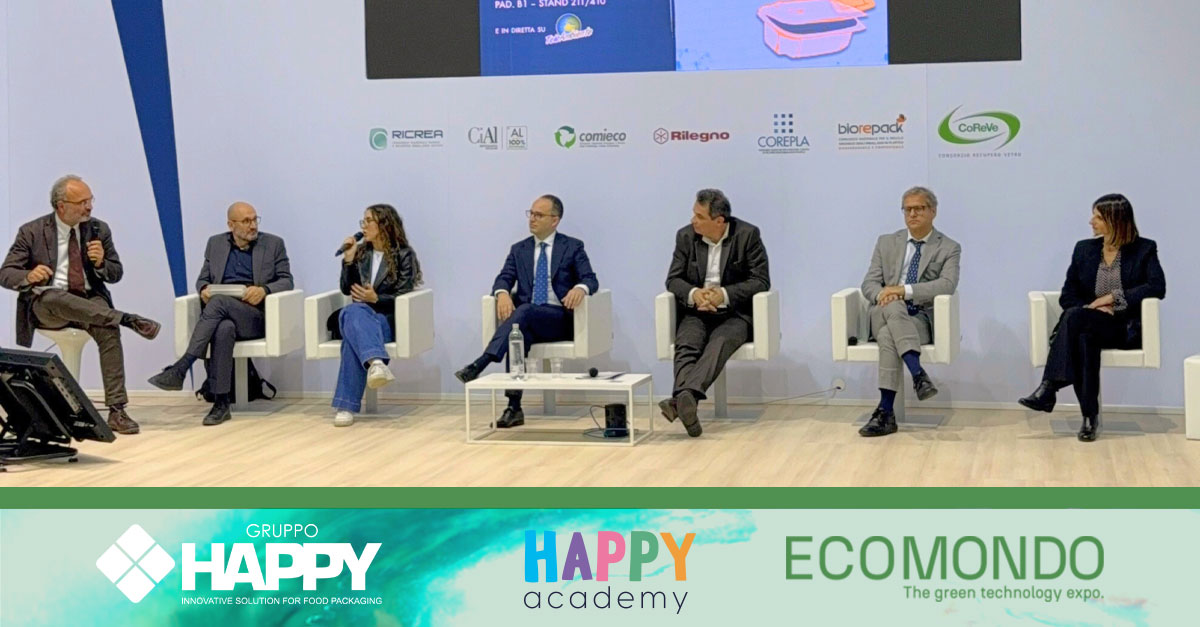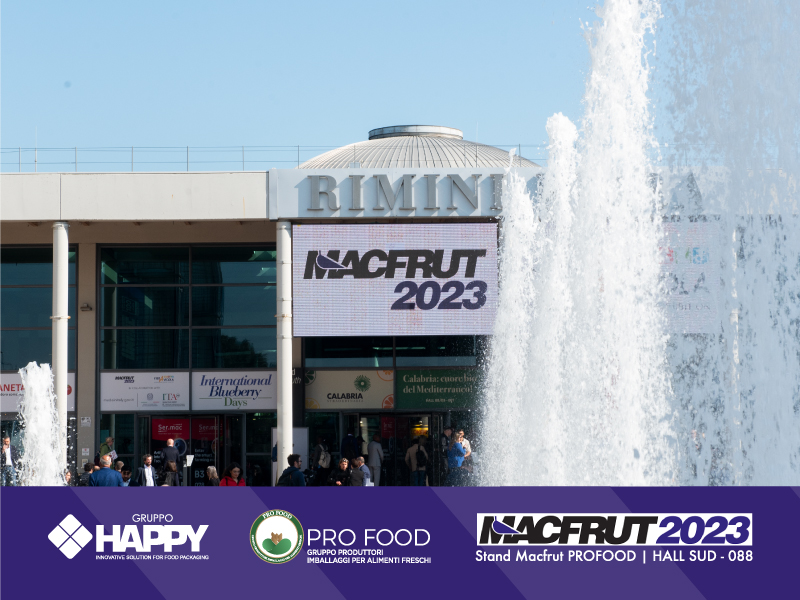

From 3 to 5 May 2023, the 40th edition of the international exhibition Macfrut, dedicated to the entire fruit and vegetable supply chain, was held – a global event which offers great opportunities for networking and learning. Nine different sectors were represented at the event, and of course materials and packaging was as important as any, a topic of significant importance for the operation of the production and transport chains within the sector and currently a topic which is increasingly under the glare of the legislative spotlight.
And it was precisely this topic which was at the heart of the conference that took place amongst the display spaces, involving some of the most famous people not only in the fruit and vegetable chain, but also from the field of recycling and production of packaging.
The event, entitled “Il valore della sostenibilità nel packaging dell’ortofrutta” (The Value of Sustainability in Fruit and Vegetable Packaging) aimed precisely to clarify how the new European regulations (covering waste and packaging) affect the world of fruit and vegetable production.
With the participation of journalist Jacopo Giliberto, who acted as presenter and moderator for the conference, the initial part shed light on the points of view, research and opinions of the supply chain representatives: Massimiliano del Core (President of Ortofrutta Italia), Massimo Marino (environmental engineer and spokesperson for the study “Imballaggi e sprechi nella filiera ortofrutticola”), Luciano Piergiovanni (president of GSICA) and Giovanni Bellomi (Director General of Corepla).
Subsequently, the round table featured Simona Caselli (President of Areflh), Nazario Battelli (Vice President of Copa Cogeca fruit and vegetable group), Pier Paolo Ciardiello (Director General of Cooperativa Sole) and Claudio Mazzini (fresh product manager for Coop Italia).
The position of the representatives was clear and summed up by the words of the President of Ortofrutta Italia: “Value, packaging, sustainability, fruit and vegetables; these are words which are absolutely compatible and reconcilable.” The main priority remains guaranteeing the highest levels of food safety and zero food waste, as only by so doing can we achieve all-round sustainability. To do this, the response is not to eliminate packaging, but rather know how to best exploit it as a key element in ensuring high-quality produce. The rule must therefore be to take a clear position and recognise the initiatives of each individual country in reducing food waste and refuse, and to realise that „plastic free“ is not the only and absolute response to pollution.
This position is also supported by Massimo Marino, with the engineer having this to say: “plastic allows us to create circular economy characteristics, to the point that we have reached those levels of focus. As regards shelf life and waste, it is important to pay close attention, because there are different distribution systems, different products, so saying: ‚yes, selling loose is sufficient‘ would be very dangerous, and is something which must be further studied.”
This is also the position of Corepla, the consortium which is responsible for collecting, recycling and recovering plastic packaging within Italy. Giovanni Bellomi (Director General of Corepla), ran through the numbers to show how in Italy, this practice is currently firmly consolidated and how limiting it would mean cancelling the great work carried out to date. Indeed, he confirms: “As of today, we number over 2,500 consortium members, including manufacturers of raw materials, packaging manufacturers and recyclers. Corepla has a mission, which we have been focusing on over the last 25 years, and we are doing everything it can in Italy to create the right circular economy and sufficient sustainability for plastic packaging.”
The problem, explains Simona Caselli (President of Areflh), is excessive simplification of the plastics and packaging issue by legislators, who are focusing on fruit and vegetables with the idea that this packaging is not necessary. The reason? Fighting the use of unnecessary and useless packaging. Claudio Mazzini (head of fresh produce for Coop Italia) talks about the 3 R’s – reduce, reuse and recycle – and the fact that the regulations seem to now be adding a fourth – renounce.
Are we sure that this is in keeping with consumer trends?
The answer is no, for two reasons:
1) Consumer trends and the distribution model are tending towards ever-smaller supermarkets, which are incompatible with loose produce sales, because they do not have a produce manager;
2) Post-Covid, the consumer tendency to look for packaged and not loose goods has increased.
It is therefore necessary to take our time to further investigate the topic and perform in-depth research to find the best solution: this process involves the whole supply chain.
In Mazzini’s words: “Ortofrutta Italia stands with everyone else: the supply chain has never been so united.”
The concluding words came from senator Luca de Carlo: “We need to modernise and update the issues relating to packaging, in order to maintain the same standards and not backslide.”
Watch the complete video of the conference: